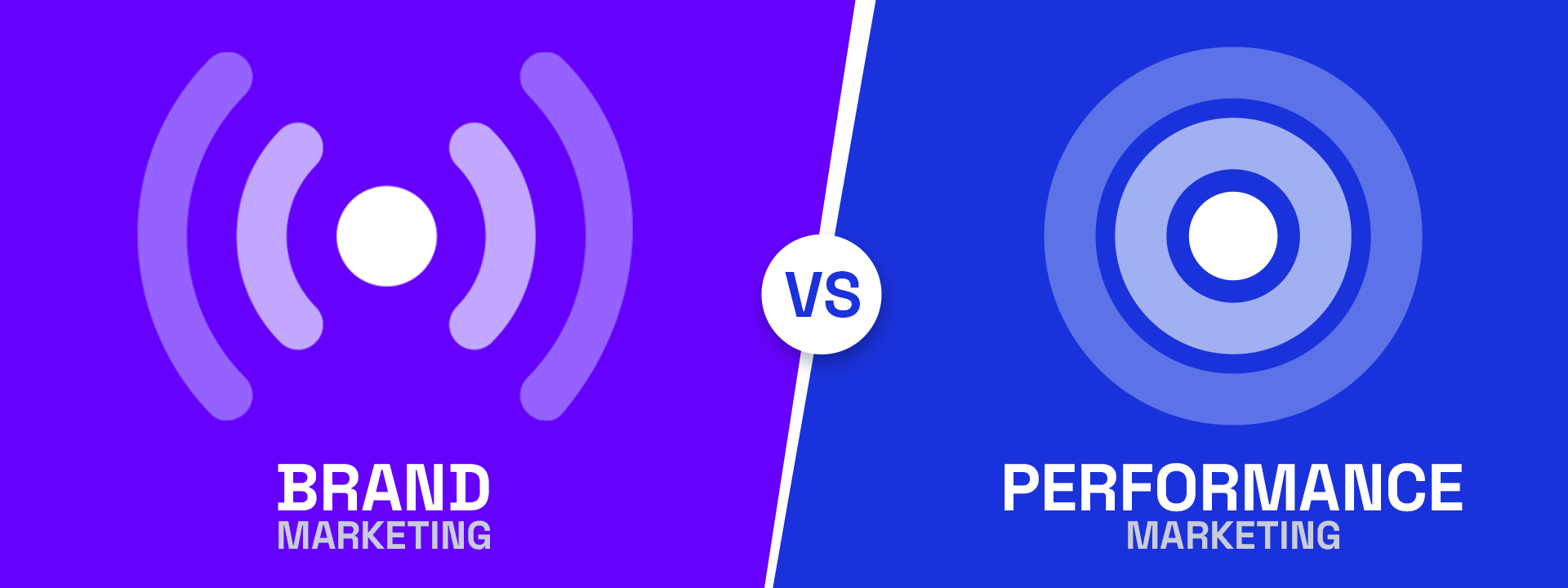In today’s volatile market, marketing budgets are often the first to be slashed forcing organizations to prioritize between brand marketing and performance marketing.
Last month, BriteBirch Collective hosted a webinar inviting BriteBirch experts in both fields to debate the merits of both approaches to help marketers make informed decisions about their own marketing strategies. Alyssa Milot and Kirk Bentham shared their brand marketing perspectives, while Rob Manne and Sharon Mostyn represented performance marketing. After an engaging discussion, we agreed that it’s essential to recognize that while there may be differences in goals between B2B and B2C businesses, both brand and performance marketing play significant roles in driving success, regardless of the level of consumer purchases involved.
Here are the five key points we took away from the webinar.
1: Brand Marketing Creates a Strong Identity
“When it comes to brand marketing, it’s exactly as it sounds: it focuses on marketing the brand itself. The primary objective is to establish a genuine human connection with people, fostering personal relationships rather than solely transactional exchanges that are often associated with performance marketing and other sales activities.” – Kirk Bentham
During challenging economic times, consumers tend to be more cautious with their spending and it can often seem out of touch for targeted ads to try to sway them. That’s why it’s crucial for brands to demonstrate shared values and establish themselves as industry leaders while setting themselves apart from competitors. And how do they do that? Through brand marketing. Branding efforts like creating brand awareness, recognition, and loyalty help companies create a lasting emotional connection with their audience. This connection makes consumers more likely to choose their brand over others. And while it might not have a significant impact on the immediate bottom line, it will ensure market dominance when the economy stabilizes. So, investing in brand marketing isn’t just important for the long term, but it can also be a lifeline during a down-market era.
2: Performance Marketing Drives Immediate Results
“The idea behind performance marketing is to grow your business based on measurability and tangible growth, as opposed to relying solely on faith and promises.” – Sharon Mostyn
With a focus on generating specific actions like leads, sales, and conversions, this approach prioritizes measurable metrics such as conversion rates, click-through rates, and return on ad spend. Sharon emphasized how regardless of the type of business or target audience, performance marketing can be utilized across various channels and sectors, including B2B, B2C, government, and non-profit organizations.
In a challenging market environment where every lead and sale matters, performance marketing becomes indispensable. As Team Performance puts it, “Its emphasis on measurability and growth allows businesses to track the effectiveness of their marketing efforts and make data-driven decisions.” By optimizing campaigns based on performance metrics, businesses can enhance their conversion rates and achieve tangible results. Performance marketing serves as a powerful tool for businesses seeking to maximize their marketing ROI and drive immediate impact, making it an essential component of any comprehensive marketing strategy.
3: Brand Marketing is a Long-Term Investment
“If you have a unique and amazing story and offering, you are likely to generate great sales by cultivating an incredible tribe of brand ambassadors and followers. This is particularly true among the younger generation, who enthusiastically share and promote it to their friends and acquaintances.” Alyssa Milot
Just like any long-term investment, how you start today can make a difference when you need it most. In today’s market, people are increasingly seeking a deeper connection with brands. They want to feel attached, and find purpose, meaning, and value in their interactions. This shift towards a story mentality is what Alyssa highlights as the significance of brand marketing. It goes beyond immediate sales and focuses on building a compelling narrative that resonates with customers on a personal level. By investing time and effort into crafting a strong brand identity, businesses can establish a genuine connection with their audience.
While performance marketing can provide quick wins and immediate results, it’s crucial to recognize that brand marketing operates on a more gradual timeline. By investing in brand marketing today, businesses lay the foundation for long-term success. They cultivate a loyal customer base that remains dedicated even during challenging economic times. This creates a reliable source of revenue and ensures the sustained growth and profitability of the business, as customers continue to choose them over their competitors.
4: Performance Marketing Maximizes ROI
“If we’re not in the data business, then we might not be in the right field. Collecting data to gain deeper insights, drive greater personalization, and achieve optimization is at the core of performance marketing. It’s the name of the game. It lets you see if there’s anything that can be enhanced with a data-driven approach.” – Rob Manne
If customer acquisition and driving growth are your primary objectives, performance marketing becomes a valuable strategy to focus your efforts on. By leveraging data-driven insights, optimizing campaigns, and targeting specific audiences, performance marketing allows you to allocate your resources effectively and achieve immediate results.
This becomes particularly crucial in an era of market downturn, where businesses need to make the most out of their marketing spend. As Rob mentioned in the webinar, the ability to track and measure campaign performance empowers marketers to make data-informed decisions, identify areas for improvement, and fine-tune their strategies for better results.
5: The Most Successful Strategies Combine Both Approaches
As Rob put it, In the realm of marketing, brand marketing can be likened to the art, while performance marketing embodies the science. These two approaches complement each other, working synergistically to achieve optimal results. By understanding the art with the science, businesses can create a comprehensive strategy that captivates the audience, builds brand loyalty, and delivers quantifiable success. It is through the harmonious integration of these approaches that the most successful marketing strategies are forged, enabling businesses to achieve their goals with creativity and precision.
So, which approach should you choose in a down-market era? The answer is not straightforward.
As we wrap up, it is evident that brand and performance marketing are not opposing forces but complementary elements in a successful marketing strategy. At BriteBirch, we emphasize the importance of harnessing the power of both approaches to create a holistic and impactful marketing campaign. By understanding the unique needs of each client and their target audience, we help them strike the perfect balance between brand-building initiatives and performance-driven tactics. Remember, it’s not a choice between art and science; it’s about balancing the strengths of both to achieve remarkable outcomes. So, whether you’re aiming to enhance brand recognition or drive immediate results, integrating brand and performance marketing will set you on the path to sustained success.
Watch the debate recap here and follow us on LinkedIn for future events and perspectives.




